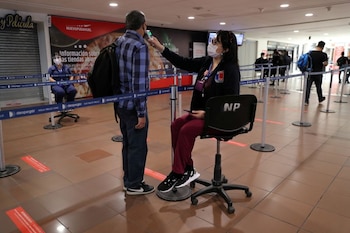
Chilean health authorities announced on Tuesday that starting next Thursday it will no longer be essential to vaccinate against covid-19 or carry out a PCR test for foreigners entering the country.
This was confirmed by the Undersecretary of Public Health, Cristóbal Cuadrado, who explained that those who do not have their complete and approved vaccination schedule will be able to enter Chile, but they will not have a mandatory card to carry out some activities such as entering bars and restaurants, cinemas or gyms.
Nor will pre-flight testing be mandatory, he added, although “non-resident tourists may be subjected to a random examination upon arrival in the country” and will need to fill out a form.
With 3.5 million infected and 57,094 total deaths, Chile is one of the countries with the greatest restrictions to stop the pandemic and the most demanding protocols for the entry of travelers.
Last Sunday, the total opening of land borders was also announced as of May, since until now it was only possible to enter the country through international airports and some concrete steps.
The possibility of removing masks outdoors will also enter into force this week in 14 of the country's 16 regions, including the Metropolitan Region, which houses the capital and where almost 8 of the 19 million inhabitants live.
The mask will continue to be mandatory in the regions of Arica and Tarapacá, in the far north, as well as in some isolated cities or territories such as Easter Island, 3,000 kilometers away in the Pacific.

All these advances could be reversed depending on the epidemiological situation, according to the plan stipulated by the Government.
The pandemic has been receding for weeks after the peak caused by the contagious omicron variant in February, which raised daily infections to almost 40,000 infections.
In the last 24 hours, there were only 1,478 new cases, 13 deaths and a national positivity rate - which months ago was around 30% - of 4%, while in the capital region it fell to 3.5%.
Patients in intensive care units have also started to decline, going from 1,000 to less than 500 in the last few days, most of whom do not have the full vaccination schedule.
In parallel, Chile has carried out one of the most successful inoculation processes in the world, reaching more than 83% of the population with two doses and almost 14 of the country's 19 million inhabitants with an additional injection.
(With information from EFE)
Keep reading:
Últimas Noticias
Debanhi Escobar: they secured the motel where she was found lifeless in a cistern
Members of the Specialized Prosecutor's Office in Nuevo León secured the Nueva Castilla Motel as part of the investigations into the case

The oldest person in the world died at the age of 119
Kane Tanaka lived in Japan. She was born six months earlier than George Orwell, the same year that the Wright brothers first flew, and Marie Curie became the first woman to win a Nobel Prize

Macabre find in CDMX: they left a body bagged and tied in a taxi
The body was left in the back seats of the car. It was covered with black bags and tied with industrial tape
The eagles of America will face Manchester City in a duel of legends. Here are the details
The top Mexican football champion will play a match with Pep Guardiola's squad in the Lone Star Cup

Why is it good to bring dogs out to know the world when they are puppies
A so-called protection against the spread of diseases threatens the integral development of dogs




